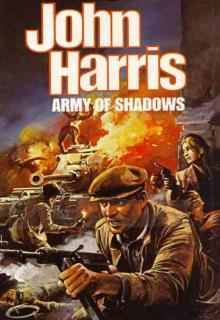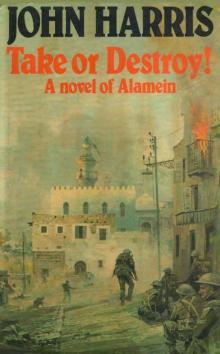- Home
- John Harris
Flawed Banner Page 2
Flawed Banner Read online
Page 2
Until a short time before, according to Sir Horace, Sir George Redmond had had on the staff of his quarters a young soldier by the name of Ma-Ling from one of the Burmese regiments that had been raised. This youth had acted as servant-cum-batman and it was he whom the charges concerned. Confronted with the allegations, Redmond had said that the soldier had already left his house and been returned to regimental duties.
‘I felt obliged to disagree with this,’ Varah went on, ‘because I had been informed that the man had not been returned to regimental duties. He had been removed from the army and returned to his village. I urged General Redmond to consider the accusations very seriously.’
Redmond had continued to remain silent, and Sir Horace had pressed on. ‘The accusation,’ he had said, ‘is that while this man was employed at your house, you behaved with him in a manner that could not be said to conform to the proprieties we live by.’ He had been careful not to put in plain words what had happened but it was pretty clear what he meant.
Shifting his position, Woodyatt now shuffled the papers. He was finally beginning to grow interested in the long-dead Redmond.
It seemed there had been an outbreak of smallpox and, as a precaution, all troops in the area had been vaccinated. But a junior army medical officer, a Lieutenant Arthur Thomas Witkins, had noticed that somehow Redmond had not been among those treated and had made arrangements for him to appear at the hospital. When Redmond had failed to turn up, Witkins had supposed perhaps he was ill in his bungalow and had felt it his duty to check up on him. With a Captain Wilfred Nicolson, one of Redmond’s aides, he had gone in the evening after duty with the excuse that he was bringing reports.
‘There,’ Sir Horace’s report continued, ‘these two men – both officers in the British army and men of good reputation – claim they found Sir George Redmond in a situation of a most unnatural nature with the soldier, Ma-Ling. They retired at once – in silence.’
But one of them had not been able to hold his tongue and gossip had reached the ears of a reporter of an English-language newspaper, the Upper Burma Gazette. Not unnaturally his editor had decided it would be wiser to leave the matter well alone.
‘Not so,’ Sir Horace wrote, ‘the native-language newspaper.’
It seemed the General’s servants were well-aware of what was happening and had passed it on to their friends. The paper had not hesitated to let it be known by means of a discreet paragraph hidden among reports of minor native events.
It would probably still never have been noticed by any but Burmese because the British did not normally read the native papers, but the Native Affairs Officer, going through them as a means of keeping his finger on the pulse of the country, had spotted it. The story had not taken long to spread.
‘There seemed,’ Sir Horace Varah reported in an magnificent understatement, ‘to be a crisis before me.’
Following Varah’s report, there were several Roneoed sheets about the law. Homosexual offences, they pointed out, were not considered punishable under the Burmese legal code, but under British civil and military law they most certainly were. After all, it was only nine years since Oscar Wilde had been sent to prison. How far the Governor should have acted in this case was doubtful, but a deputation of officers – and Woodyatt wondered how many of them had disliked or envied the ranker risen to major-general and had seen in the situation a chance to be rid of him – had requested that the formalities of a court martial be set in motion. Sir Horace, however, had preferred to refer the matter to Whitehall.
Redmond had complained that the accusation consisted of nothing but hearsay and gossip, that the two officers concerned might have been drunk, and that the gossip might even have been part of a campaign to embarrass him. He had had no illusions, it seemed, about how he was regarded by the wealthy officers to whom he had once been subordinate.
‘I went over all these points,’ Sir Horace reported. But he had also indicated to Redmond that there was a factor that could not be avoided. The soldier, Ma-Ling, had been returned to his village not by Redmond but by the aide, Captain Nicolson, after the incident at the bungalow. If an enquiry were placed on an official basis, he would have to be brought back to give evidence.
‘This,’ Sir Horace wrote, ‘was greeted with silence.’ He had pointed out to Redmond, his report continued, that he would probably feel the need to consult with people in London, even that he might find in necessary to seek a command elsewhere. ‘I urged him, in fact,’ Varah announced, ‘to depart at once as if he were going on leave, on the SS Omshah, which was due to sail in three days’ time.’
At this point Sir Horace Varah retired from the fray and his place was taken by a man with the unusual name of Captain Albert Aimable Slough, who seemed to have been some sort of aide to the Adjutant-General.
‘Sir George was know aboard the Omshah,’ he reported, ‘and there were many awkward moments. Why was he going to London? He was asked. When was he returning to Burma?’ A young nobleman by the name of Lord Seley, who was also an officer in the army as well as a fellow-Yorkshireman and an ardent admirer of Redmond, was an eager questioner. He had joined the ship at Aden. His questions had been answered evasively.
In London, the Adjutant-General, an old friend of Redmond’s, had already received a coded telegram which had startled him. He had immediately gone to see the Commander-in-Chief, the last incumbent of that high office before it had been discontinued that very year. At the time it had been held by the legendary Lord Roberts of Kandahar, the man who had regained Kabul after the British disaster there in 1848, a man who had won a Victoria Cross during the Indian Mutiny and whose son had posthumously been awarded another during the Boer War.
He had been shocked by the information he received and couldn’t believe it of Redmond whom he knew well. ‘However,’ Captain Slough wrote, and it wasn’t hard to believe that the comment came from Captain Slough not Lord Roberts, ‘Sir George Redmond was a bachelor and it had been noticed that he was always friendly with the Burmese and had been seen to offer sweets to their children.’
When the Adjutant-General had met Redmond and listened to his account of the affair, there were, according to Captain Slough, areas of hesitation in Redmond’s replies which did not help to render his version of the story credible. Added to the report was a copy of army law, which covered the whole area of homosexual activity under one simple Victorian heading – ‘Sodomy’ – an act calling for a prison sentence of anything up to life.
Perhaps, Woodyatt decided, it would have been different for a major-general who was a known hero. In such a case an admission of guilt would probably have meant only a demand for resignation. In the unlikely event of a refusal, cashiering for conduct unbecoming an officer would inevitably have been the result, and would have been followed by the removal of the guilty party’s name from the army list with a loss of pay and pensions. There would have been the slamming of doors in his face, unpleasant publicity in the cheap newspapers, comic songs in the music halls, social ostracism, expulsion from clubs and ill-mannered comments from shopkeepers.
During his interview with Redmond, the Adjutant-General had not offered a chair and had remained on his feet himself. He had informed Redmond that it was his unpleasant duty to order his return to Burma to face a court martial. He had shown no indication of his old friendship and had not offered to shake hands.
Leaving the Adjutant-General’s office, Redmond had apparently wandered round London for some time. He had been to his club but his story had already become known and he had not stayed long. First he had been recognised in Hyde Park by a policeman who had seen him walking alone, his hands behind his back, his head down, deep in thought. Then it emerged that he had spoken for a minute or two to an old soldier from his regiment who had spotted him lighting a cigarette in the street near the side door of the German Embassy at the Duke of York’s steps.
It seemed an odd place to be, and Woodyatt wondered what he was doing there. By this time he was deeply involv
ed and even beginning to feel sympathy for the wretched Redmond. The drama was building up and he could feel the tension coming from the scrawled lines on the dog-eared papers in front of him.
There was a photograph of Redmond in the next batch of papers, and one or two drawings of him reproduced from journals. Woodyatt wasn’t sure what he had expected but it was nothing like what he saw. Somehow he had pictured a tall slender man with a soft face, an intellectual soldier perhaps. But here was a good looking man of strong physique, fair-haired with a straight nose, a smiling mouth and large handsome eyes. He was in uniform and, in the manner of the day, looked stiff, formidable and arrogant, but there was no getting away from the intelligence and humour in his face.
When Redmond subsequently caught the ferry across the Channel and then the train to Paris, the story there was taken up by a Major Albert Francis Cummings Darby, who had been Assistant Military Attaché at the Embassy.
Darby’s first comment indicated that Redmond had taken a small apartment in a Hotel Angleterre in the Rue Jacob. ‘Unostentatious,’ Darby’s report pointed out. ‘Genteel clientèle.’
Attached to the report was the copy of a clipping from a Burmese English-language newspaper. It referred to a meeting of the Legislative Council of Upper Burma at which an unexpected question had been put to the Governor. The questioner had read in a Reuters’ report that General Redmond was to return to Burma and wanted to know why. Like everyone else he had clearly heard the rumours and had believed the affair would blow over quietly with the general replaced and the scandal allowed to die.
The question had brought a long reply from the Governor and Woodyatt could well imagine the expressions on the faces of the Members of the Council – the disgust, the indignation, the surprise of those not in the know. Yet it was a reply which had not satisfied the questioner, who had insisted on knowing what Redmond’s status would be on his return. This time the Governor was more sharp. ‘Officers about to be tried by court martial,’ he had said, ‘are considered to be under arrest.’
That was the end of the report from Burma but, judging by what followed, the press, up to that point largely kept in the dark, had not waited long to get the story on the wires to Delhi, London, Paris and the rest of the world.
Woodyatt sat back and lit a cigarette. He could see headlines among the piles of papers – ‘Grave Charges Against Sir George Redmond’ read the New York World.
Laying down the cigarette, Woodyatt reached for the next batch of papers. They began with a hurried note from Major Darby. ‘Sir George Redmond,’ it stated, ‘planned to take the night train from Gare de Lyon to Marseilles.’ Attached to the report were the ticket and the reservation for a sleeper. ‘He intended,’ Darby continued, ‘to pick up SS Howadah, bound for India. Guests at hotel unaware of identity.’
Woodyatt could well imagine the dread with which Redmond must have faced every new day’s journals. The fact that he was prepared to return to Burma indicated that he had been expecting to be acquitted. Whatever the two officers, Witkins and Nicolson, had seen, when it came to the trial they would inevitably agree, willingly or otherwise, that they might have been mistaken. The whole thing would be treated with discretion, the general would leave Burma and quietly drop out of sight. The army would never permit gossip to continue and up to that point there had been no publicity.
But now, there it was in bold type with Redmond’s face staring out from the front page. Woodyatt picked up the newspaper account gingerly. It was by-lined ‘Rangoon’ and it made no attempt to hide anything.
‘It seems,’ Darby reported, ‘that the general was in the habit after breakfast of collecting all English-language newspapers from a kiosk near the Church of St Germain des Prés and carrying them back to the hotel to peruse. After reading the story in the New York World, he sat in the salon, quietly smoking a cigar. Then, after a while, he went to his room, took a gun from his luggage and shot himself through the right temple. He was found by a maid going to clean the room.’
The manager of the hotel had telephoned the police and the British Embassy. By the time Major Darby had reached the scene with the British Consul General, the corpse was already being examined by a British medical man, Dr Angus McVicar, and a Paris police surgeon. The shocked Darby had returned to the Embassy to inform the ambassador who had telegraphed the Under Secretary for Foreign Affairs in London. A copy of the telegram was included.
Woodyatt was just sitting back staring at the papers when Pullinger appeared. ‘How are you getting on?’ he asked.
Woodyatt passed a hand across his face. ‘He’s just shot himself,’ he said.
‘Come and see me when you’ve finished. I’ll still be here.’ As the door closed, Woodyatt returned to the papers. It was obvious by this time that Darby, the attaché, was well out of his depth. Reading between the lines, it seemed that the ambassador, heavily engaged with a projected visit by a British military mission, had not been very helpful.
Woodyatt lit another cigarette, frowning, and picked up the next sheet. The news had clearly thrown the War Office and the Foreign Office into uproar. The British newspapers were all wary and backed away from being explicit. All of them expressed the wish that the dead man would be laid to rest in his native Yorkshire soil.
That their hopes were in vain was obvious from the notes that must have been whirling between London and Paris. The War Office had quickly made up its mind that it wasn’t going to be involved. A funeral in England would mean problems over the removal of the body, newspapermen with their questions, military honours, and a lot of very difficult publicity.
‘A quiet interment in one of the Paris burial grounds should be quickly arranged,’ went the note from the Adjutant-General to the ambassador. ‘A whisper in the ear of the next of kin about the situation should make it possible. The family would never wish to face the adverse publicity.’
‘The next of kin,’ the telegram ended, ‘is Mr Henry Howard Redmond, JP, of Pinder, Yorkshire, where the deceased general was born.’
From then on, it seemed a whole snowstorm of telegrams had passed between London and Paris. Within hours Mr Henry Howard Redmond, JP, had been unearthed and had very sensibly given his consent for the funeral to take place in Paris the following day. Darby, the unfortunate attaché saddled with the affair, was obviously very nervous and had contacted a firm of British solicitors in Paris to help him prepare a statement. ‘They helped to arrange the funeral of General MacDonald a year ago,’ he’d commented. ‘They should know what to do.’ There were letters making arrangements for carriages and wreath, and a copy of the death certificate for the Director of the Cemetery of Père Lachaise. There was also a note from Darby to the British doctor, McVicar, reminding him that he would be expected to attend.
Wondering how it all worked out, Woodyatt closed the file on the last of the papers. There were no reports of the funeral.
Nothing. And, having come to the conclusion that Major Darby was a careful and sensible person, he wondered why not. Surely he would have made certain his report ended with the indication that the dead soldier had been placed under the soil, duly blessed by a priest, and that the family had returned home, if not exactly content, then at least satisfied that all the proper rites had been attended to.
But there was nothing.
Frowning, Woodyatt looked at his watch. It was nearly dusk and he wondered if Pullinger were still in the building. Rising, he headed down the corridor. Pullinger’s light was on and he was dozing in his chair, his feet on the desk, alongside a thick file of papers. The rest of the building was silent.
As the door opened, Pullinger’s eyelids lifted and he became awake and alert at once. ‘Finished?’
‘I don’t know. I suspect not. I think there’s more. It isn’t wrapped up properly.’ Woodyatt gestured at the file on the desk. ‘Is that the rest of it?’
Pullinger nodded. ‘Yes,’ he said. ‘That’s the end of the story. Or is it?’
‘You’re behaving as if i
t’s a major puzzle.’
Pullinger’s eyebrows rose. ‘But that’s exactly what it is,’ he said. ‘From here on, we go through the thing together.’
‘Why?’
‘Because that’s how it’s got to be. You’ll see why eventually.’ Without opening the file, Pullinger waved at the whisky bottle. He seemed in a dour mood. ‘Help yourself. Have a cigarette. Make yourself comfortable. You got to the point of the funeral, I assume?’
‘Yes.’
‘Read everything?’
‘Everything.’
‘Right. Let’s get on with it. The chaps in Paris, of course, were unaware that across the Channel in Yorkshire the announcement of Redmond’s death had already started a wave of anger, disbelief and shock at every level of society. It spread to London, the rest of the country, and even the Dominions where there were similar reactions because Redmond had commanded Australian troops in South Africa.’
‘So why didn’t Darby finish his report with a note about the funeral at Père Lachaise?’
Pullinger frowned. ‘Because there wasn’t one. It didn’t take place.’
‘What!’
‘Well, not at Père Lachaise. You see, unknown to Henry Howard Redmond, JP, and the rest of the family, unknown to the army, the Foreign Office, the War Office, the Paris Embassy, and the Legislative Council in Upper Burma, Redmond was married.’
‘What!’
Pullinger looked angry suddenly. ‘Oh, yes. There was a Lady Redmond, and she now enters the ring. On your left in the blue corner. And she wasn’t going to have any funeral in Paris. She was going to have it in Redmond’s native Harrogate – a place, I might add, that has great importance in Yorkshire, that most independent and bloody-minded area in the British scheme of things. She wasn’t having it where it wouldn’t be noticed. She wanted it where it – and she – would be seen.

 China Seas
China Seas The Mercenaries
The Mercenaries Road To The Coast
Road To The Coast The Thirty Days War
The Thirty Days War The Old Trade of Killing
The Old Trade of Killing Ride Out The Storm
Ride Out The Storm Corporal Cotton's Little War
Corporal Cotton's Little War Fox from His Lair
Fox from His Lair Paint The Rainbow
Paint The Rainbow Flawed Banner
Flawed Banner Covenant with Death
Covenant with Death So Far From God
So Far From God The Sea Shall Not Have Them
The Sea Shall Not Have Them The Cross of Lazzaro
The Cross of Lazzaro Smiling Willie and the Tiger
Smiling Willie and the Tiger Harkaway's Sixth Column
Harkaway's Sixth Column The Sleeping Mountain
The Sleeping Mountain The Claws of Mercy
The Claws of Mercy North Strike
North Strike Picture of Defeat
Picture of Defeat Army of Shadows
Army of Shadows Right of Reply
Right of Reply Getaway
Getaway The Lonely Voyage
The Lonely Voyage Take or Destroy!
Take or Destroy! The Backpacker
The Backpacker A Funny Place to Hold a War
A Funny Place to Hold a War Swordpoint (2011)
Swordpoint (2011) A Kind of Courage
A Kind of Courage